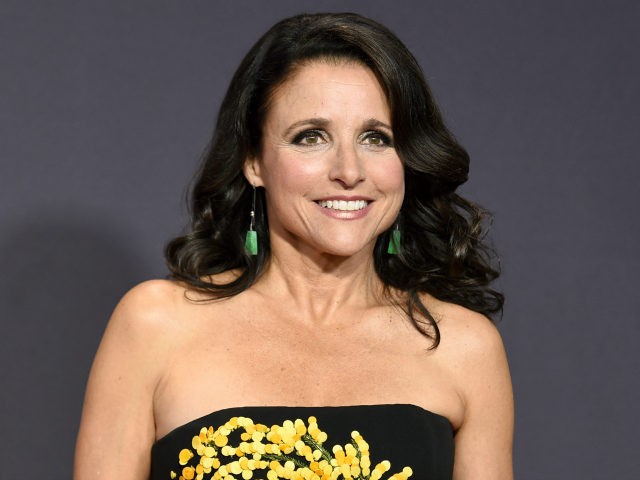Actress and comedian Julia Louis-Dreyfus announced on Twitter Thursday that she has been diagnosed with breast cancer.
The 56-year-old star of HBO’s Veep and former Seinfeld cast member tweeted, “1 in 8 women get breast cancer. Today, I’m the one.”
Louis-Dreyfus added:
The good news is that I have the most glorious group of supportive and caring family and friends, and fantastic insurance through my union. The bad news is that not all women are so lucky, so let’s fight all cancers and make universal health care a reality.
Actor Adam Best was among those who wished Louis-Dreyfus well and complimented her on her call for universal health care.
“Few people could get diagnosed with cancer and immediately think of others instead of themselves,” Best tweeted. “Julia Louis-Dreyfus is such a powerhouse.”
It turns out, however, that women faced with breast cancer who have supportive family and friends and free market health care are likely far luckier than those living in countries with universal health care.
In 2013, Dr. Scott Atlas – a former Professor and Chief of Neuroradiology from 1998 until 2012 at Stanford University Medical Center – provided data about Britain’s National Health Service (NHS) – which the left often holds up as the pinnacle of quality universal health care.
In a column at Forbes, Atlas noted, “[T]he problems of the NHS are severe, notorious, and increasingly scandalous in the most fundamental attributes of any health care system: access and quality.”
He continued:
Waits for care are shocking in the NHS, frequently exposed by British media reports, and long proven by facts, yet they go virtually unreported in the U.S. For instance, in 2010, about one-third of England’s NHS patients deemed ill enough by their GP waited more than one additional month for a specialist appointment.
…
Access to medical care is so poor in the NHS that the government was compelled to issue England’s 2010 “NHS Constitution” in which it was declared that no patient should wait beyond 18 weeks for treatment – four months – after GP referral. Defined as acceptable by bureaucrats who set them, such targets propagate the illusion of meeting quality standards despite seriously endangering their citizens, all of whom share an equally poor access to health care.
Regarding breast cancer treatment, women in the United States are faring much better than their counterparts across the pond coping with universal health care, according to Atlas:
For cancer, American patients, both men and women, have superior survival rates for all major types. For some specifics, per Verdecchia in Lancet Oncology, the breast cancer mortality rate is 88 percent higher in the United Kingdom than in the U.S.; prostate cancer mortality rates are strikingly worse in the UK than in the U.S.; mortality rate for colorectal cancer among British men and women is about 40 percent higher than in the U.S.
Apparently, universal health care is not the panacea in the U.K. that Hollywood elites wish on United States citizens.
“Reality also prevents accepting the fantasy that the NHS-style socialized medicine as initiated in 1948 has actually lived up to the so-called ‘core value’ of British society,” Atlas wrote. “For if true, it must seem odd that people of means in Britain consistently look elsewhere for medical care. About six million Brits now buy private health insurance, including almost two-thirds of Brits earning more than $78,700.”

COMMENTS
Please let us know if you're having issues with commenting.